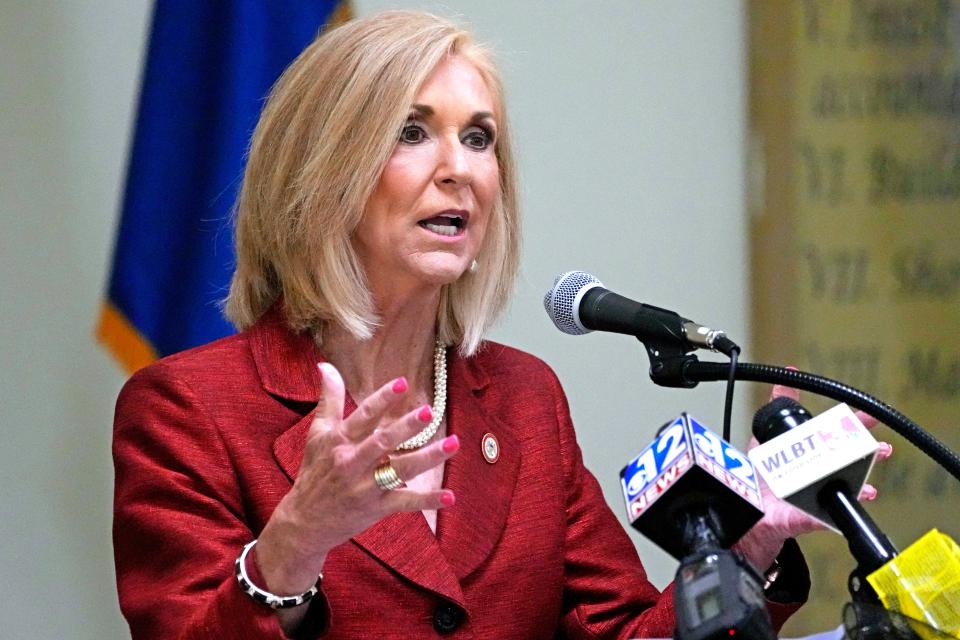Mississippi AG Lynn Fitch opposes rule change aimed at protecting abortion medical records
- Oops!Something went wrong.Please try again later.
- Oops!Something went wrong.Please try again later.
Mississippi Attorney General Lynn Fitch wants the state to be able to investigate and compel information on out-of-state abortions, according to a letter she authored and has been co-signed by 18 other Republican attorneys general in response to a White House-backed federal rules change that would further shield reproductive health medical records.
Tennessee Attorney General Jonathan Skrmetti last month signed on to the letter, which was authored by Fitch and addressed to Secretary Xavier Becerra of the federal Department of Health and Human Services.
The proposed rule would prohibit the use or disclosure of protected health information to "investigate, or prosecute patients, providers, and others involved in the provision of legal reproductive health care, including abortion care."
Fitch's letter argues the rule would "unlawfully interfere with states' authority to enforce their laws" and calls it a "solution in search of a problem."
"HHS does not have authority to change the law in contradiction of the statute passed by Congress," Skrmetti spokesperson Elizabeth Lane said in a statement Monday.

The letter was first reported by nonprofit news outlet Mississippi Today.
HHS held an open comment period as part of the proposed rule change, which the Biden administration first floated in April in response to a wave of abortion restrictions that arose in the wake of the U.S. Supreme Court ruling last summer overturning the constitutional right to an abortion. Abortion restrictions often vary widely from state to state.
Medical records are protected by some federal privacy laws but are still subject to court orders, and states currently can investigate out-of-state care. Top prosecutors like attorneys general also have other legal tools at their disposal to compel providers to turn over medical records for investigatory purposes, such as the recent wide-reaching investigative net cast by Skrmetti into Vanderbilt University Medical Center patient records over their transgender health care clinic.
At the time of the rule proposal, an HHS official said the rule change was crafted after the Roe v. Wade precedent was overturned and doctors "expressed fear, anger, and sadness that they or their patients may end up in jail for providing or obtaining evidence-based and medically appropriate care."
Fitch's letter said it was a "false narrative that States are seeking to treat pregnant women as criminals or punish medical personnel who provide lifesaving care."
Some doctors have argued state laws are often not clear-cut, disregard the nuances of medicine and have had damaging impacts on women's reproductive care. In Tennessee, the state's total abortion ban required physicians to knowingly commit a felony when performing an abortion to prevent the death or severe injury of a pregnant patient. It included an affirmative defense provisions, meaning doctors could justify their actions but only after facing criminal charges.
Lawmakers this spring amended the law, carving out a very narrow legal exception for abortions performed to prevent the life or severe injury of the pregnant patient. Abortions for other medical reasons, such as when a fetus has a severe defect incompatible with life, are not allowed under medical law until the pregnant patient's life is threatened, which some Tennessee doctors say is a dangerous precedent.
The Republican-backed letter countered a letter in support signed by 24 Democratic attorneys general, who urged a quick adoption of the rule as exiting privacy protections "fail to contemplate circumstances in which basic health care is subject to civil liability and criminal penalties.”
Reach Melissa Brown at mabrown@tennessean.com.
This article originally appeared on Nashville Tennessean: Mississippi AG Lynn Fitch opposes protecting abortion medical records

